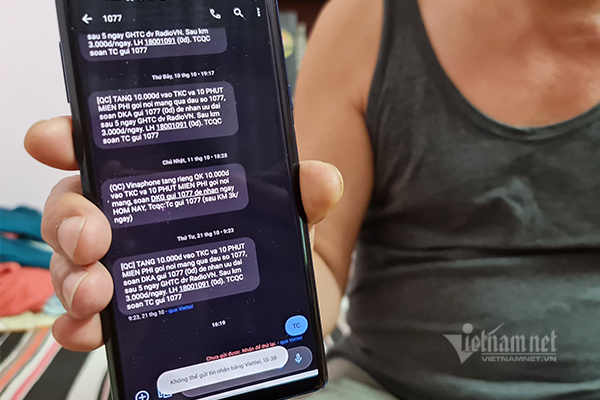Tuan Anh in Hanoi complained that he is often harrassed by ad messages. The problem is that the messages are from the mobile network he is using.

“One ad message comes every several days. Most messages are about how to receive data for free. Though the data is advertised as free, it cost me at least VND5,000 to get the data packages,” he said.
Having registered for DoNotCall list (the list of subscribers who refuse all ad messages and calls), Tuan Anh said the list has helped prevent unwanted messages. However, he still feels unsatisfied.
“The number of spam messages has decreased. However, I still have been disturbed by messages from the mobile network operator,” he said.
According to Anh, he sent a message to refuse ads as instructed by the network operator, but several days later, ad messages came again.
Ngo Viet in the Linh Dam urban area in Hanoi, a subscriber of Viettel, also complained that he is a victim of ad messages.
“The ads don’t come from normal subscribers, but from numbers with prefixes of 9882, 9336, 9565, 1375 and1077,” he said.
Most of the messages have content inviting users to register service packages and added value services, such as ad prevention or call recording.
Viet raised a question about network operators becoming the sources of spam messages instead of preventing spam.
The government Decree 91 on fighting against spam messages, emails and calls took effect in early October, laying down a legal framework to prevent spam and unwanted messages.
Under the decree, ad messages are defined as messages aiming to introduce products and services to subscribers. The ad messages sent without the consent of users or ad messages violating regulations on ad message sending are listed as spam messages.
Telcos’ customer care messages will not be counted as advertising messages if they only inform people about the activities and utility features of telecommunication services.
In the two cases, messages with information about service packages, sent with high frequency, are understood as behavior of spreading spam messages by network operators.
A high number of ad messages from network operators are not labelled ‘QC’ or ‘AD’ (advertisement), and not associated with brandnames as stipulated in Decree 91.
Many subscribers complain that they cannot send messages refusing these ad messages.
With the violations, mobile network operators will be fined VND5-10 million under Article 94 of Decree 15.
Trong Dat

Decree trues to 'clean up' digital space by controlling spam
As the compiler of Decree 91 on fighting spam SMS, calls and messages, an official with the Authority for Information Security, Dang Huy Hoang, said he was happy that he could contribute to reducing ‘garbage’ in digital space.

34,700 subscribers blocked for making spam calls
According to the Telecommunications Department under the Ministry of Information and Communications, mobile network operators in Vietnam locked 34,700 subscribers that made spam calls and prevented over 9 million fake calls in the last three months.